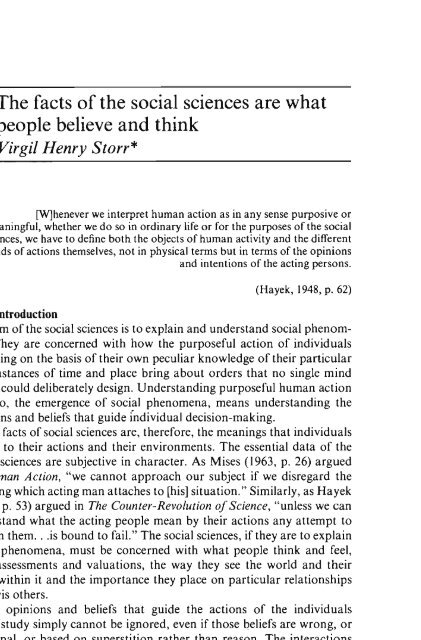Handbook on Contemporary Austrian Economics
Handbook on Contemporary Austrian Economics
Handbook on Contemporary Austrian Economics
Create successful ePaper yourself
Turn your PDF publications into a flip-book with our unique Google optimized e-Paper software.
3 The facts of the social sciences are what<br />
people believe and think<br />
Jlirgil llenryStorr*<br />
[W]henever we interpret human acti<strong>on</strong> as in any sense purposive or<br />
meaningful, whether we do so in ordinary life or for the purposes of the social<br />
sciences, we have to define both the objects of human activity and the different<br />
kinds of acti<strong>on</strong>s themselves, not in physical terms but in terms of the opini<strong>on</strong>s<br />
and intenti<strong>on</strong>s of the acting pers<strong>on</strong>s.<br />
(Hayek, 1948, p. 62)<br />
3.1 Introducti<strong>on</strong><br />
The aim of the social sciences is to explain and understand social phenomena.<br />
They are c<strong>on</strong>cerned with how the purposeful acti<strong>on</strong> of individuals<br />
operating <strong>on</strong> the basis of their own peculiar knowledge of their particular<br />
circumstances of time and place bring about orders that no single mind<br />
did or could deliberately design. Understanding purposeful human acti<strong>on</strong><br />
and, so, the emergence of social phenomena, means understanding the<br />
opini<strong>on</strong>s and beliefs that guide individual decisi<strong>on</strong>-making.<br />
The facts of social sciences are, therefore, the meanings that individuals<br />
attach to their acti<strong>on</strong>s and their envir<strong>on</strong>ments. The essential data of the<br />
social sciences are subjective in character. As Mises (1963, p. 26) argued<br />
in Human Acti<strong>on</strong>, "we cannot approach our subject if we disregard the<br />
meaning which acting man attaches to [his] situati<strong>on</strong>." Similarly, as Hayek<br />
(1979, p. 53) argued in The Counter-Revoluti<strong>on</strong> of Science, "unless we can<br />
understand what the acting people mean by their acti<strong>on</strong>s any attempt to<br />
explain them .. .is bound to fail." The social sciences, if they are to explain<br />
social phenomena, must be c<strong>on</strong>cerned with what people think and feel,<br />
their assessments and valuati<strong>on</strong>s, the way they see the world and their<br />
place within it and the importance they place <strong>on</strong> particular relati<strong>on</strong>ships<br />
vis-a-vis others.<br />
The opini<strong>on</strong>s and beliefs that guide the acti<strong>on</strong>s of the individuals<br />
under study simply cannot be ignored, even if those Qeliefs are wr<strong>on</strong>g, or<br />
irrati<strong>on</strong>al, or based <strong>on</strong> superstiti<strong>on</strong> rather than reas<strong>on</strong>. The interacti<strong>on</strong>s<br />
between two individuals, for instance, are explainable <strong>on</strong>ly in terms of<br />
what they believe about the nature of their relati<strong>on</strong>ship (Hayek, 1948,<br />
p. 60). If Jack believes that Tom is his blood relative, whether Jack is in

















